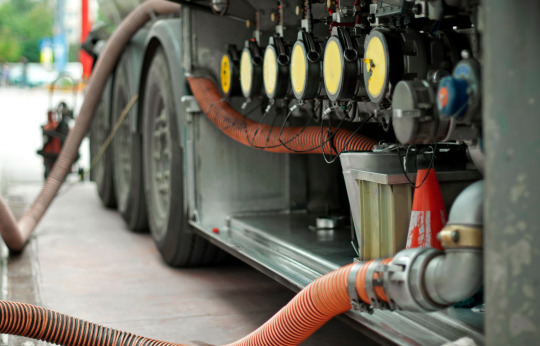#fuel monitoring
Explore tagged Tumblr posts
Text
Enhance your fleet's efficiency with GPS for Track's best fuel management solution. Our advanced system offers real-time fuel monitoring, consumption analytics, and cost-saving strategies. Stay ahead of fuel theft and optimize fuel usage to maximize your savings. Discover the benefits of our comprehensive fuel management solutions today!
1 note
·
View note
Text
The Efficiency of Modern Fuel Management Systems for Fixed and Mobile Storage
In the continuously evolving industry of fuel, managing the complexities of storage has always been a pressing concern. But with the advent of modern fuel management systems, the game is noticeably changing. Today, these sophisticated systems deliver profound advantages not only to fixed fuel farms but also to mobile storages like service trucks. Welcome to the era of revolutionising fuel industries, where the versatility and efficiency of fuel management systems are transforming operations with increased reliability and minimise risks.

As we witness this transformation, understanding the nuances of these modern solutions becomes crucial. This article aims to delve into the specifics of fuel management systems, explaining their suitability for both fixed and mobile storage. We will explore their key features, including tank overfill prevention, tank level monitoring, fluid loss control, and fuel-stock condition management. So, whether you're an industry professional or simply curious, this journey of unravelling the intricacies of fuel management systems promises to shed new light on fuel industries' progressive future.
Understanding Fuel Management Systems
Understanding the intricacies of modern fuel management systems requires a fundamental recognition of both their purpose and operation. In essence, a fuel management system is an innovative technology designed to facilitate the effective supervision and optimization of fuel consumption and storage. Its primary task? To control, monitor, and manage the usage, distribution, and inventory of fuel within an organisational structure, providing a solution that is as efficient as it is necessary.
From a practical standpoint, these systems boast of advanced functions such as real-time tracking of fuel levels and consumption, detailed reporting, and preventive measures against risks like overfills. Utilising sensors, gauges and complex software, they provide a comprehensive analysis of fuel usage, flagging inefficiencies for immediate intervention and potential calibration. This kind of proactive management alleviates traditional difficulties in fuel control and drives economic and functional advantages in its stride.
However, the scope of fuel management systems extends beyond these operational benefits. They hold a critical position within the fuel industry, playing a pivotal role in executing effective, sustainable and safe fuel usage protocols. By delivering a higher control level over fuel resources, they significantly contribute to accelerating operational efficiency, reducing environmental impact, and promoting safety within the workplace.
Fuel industries have come to rely heavily on these systems for managing their extensive fuel inventory. They bring unparalleled precision to inventory management, negating the need for manual checks, reducing errors, and freeing up significant manpower for more strategic tasks. The wealth of data collected by these systems also provides a much-needed insight into consumption patterns and inefficiencies, leading to improved strategies and cost savings.
In a nutshell, fuel management systems have shifted from being seen as an operational luxury to a business essential in the fuel industry. Its integral role in promoting efficiency, safety, environmental sustainability, and cost-effectiveness has indeed reshaped industry processes, adding a layer of sophistication that's becoming harder to ignore in today's fast-paced, technology-driven world.
Therefore, these intelligent systems' importance cannot be overstated, given their profound influence over the execution and management of everyday fuel operations across various industries. They represent a significant stride towards a more sustainable and efficient future for global fuel industries.
Fuel Management Systems: For Fixed Fuel Farms
In the world of fixed fuel farms, where large volumes of diverse fuels are stored and managed, establishing effective monitoring and control is paramount. That is where fuel management systems prove to be an ideal solution. Designed with a universal applicability that seamlessly fits onto the structure of fixed fuel farms, these systems have truly revolutionised the traditional ways of fuel handling.
Fuel farms often encounter challenges such as assessing accurate inventory levels, mitigating fuel theft, handling potential operational hazards, and streamlining fuel distribution. Fuel management systems address these concerns adeptly. With real-time tank level monitoring, they eliminate the guesswork involved in manual monitoring. By tracking fuel consumption and distribution, they deter theft and leakages by flagging anomalies. Moreover, their in-built protection against tank overfilling boosts the safety profile of these fuel farms.
Additionally, these state-of-the-art systems offer a precise overlook on the fuel-stock condition, contributing to better resource planning and management. With these systems in place, operators can ensure the optimal quality of their fuel stock. It minimises the risk of fuel contamination, a frequent issue in fixed fuel farms that can lead to considerable operational and financial losses.
On top of the operational advantages, these powerful tools also impart significant cost-saving benefits to fuel farms. They manage to reduce unnecessary waste, promote efficiency in distribution, and help avoid costly spills or leaks. Accurate data reporting also provides operators with a detailed and reliable analysis of their performance, leading to better-informed decisions on resource allocation and usage.
Fuel management systems tailor perfectly to the demands of fixed fuel farms, equipping them with the tools to perform more efficiently. By promoting safety, enhancing monitoring and control, and improving fuel-stock management, these systems offer a bright new vision of operational excellence for fixed fuel farms, firmly anchoring their position in the heart of the fuel industry's future.
Therefore, the suitability of fuel management systems for fixed fuel farms is evident, optimising operations with an efficacy that is simply unmatched by traditional means, and marking a significant step towards a more digitised, safe and efficient future for fuel farms worldwide.

Fuel Management Systems: For Mobile Storages
The propulsion of fuel management systems into the sphere of mobile storage, including service trucks, has led to a new dawn of operational capability and efficiency. These vehicles, often tasked with transporting and delivering fuel to onsite, often challenging locations, now have a formidable ally in these innovative systems.
One of the most significant advantages service trucks derive from the installation of fuel management systems is the ability to accurately monitor fuel levels on the go. In the dynamic, fast-paced environment of mobile fuel storage, this function can be decisive in averting risks and optimising delivery schedules, making the fuel transportation process more efficient and secure.
Moreover, with fluid loss control, these systems provide a security net against theft, leaks, or overuse of fuel. Accurate tracking and management of fuel usage ensure that every gallon of fuel is accounted for, reducing unexpected costs and maintaining the quality required for optimal service truck operation.
Now, let's enlighten on a real-world example showcasing the efficiency of fuel management systems in mobile storage scenarios. Consider a fleet of service trucks operating in remote and diverse terrains, carrying precious cargos of fuel. These can range from an oil rig in the middle of the ocean to a mining site located in a mountainous region. With the advent of an integrated fuel management system, the fleet operators can receive real-time updates on their fuel levels, consumption rates, and potential system issues, directly on their devices.
Another case in point would be a large-scale construction site, where various vehicles, including service trucks, need regular fueling. A robust fuel management system can streamline this process, ensuring that there is minimal downtime due to unnecessary fuel shortages, leaks, or overfills. This would significantly improve productivity and efficiency at the site.
Fuel management systems enhance service truck operations to an unprecedented level, making them crucial for industries relying heavily on these vehicles for their fuel transportation and supply needs. By ensuring optimal utilisation of resources and using real-life data for informed decision-making, these systems truly manifest the perfect synergy of technology and efficiency for mobile storage units, redefining the potential of fuel industries worldwide.
Key Features of Modern Fuel Management Systems
To fully grasp the revolutionary impact of modern fuel management systems, it is vital to explore their essential features, which together form a harmonious blend of efficiency, safety, and sustainability.
The first significant attribute is overfill prevention. Overfilling tanks can lead to hazardous spills, potential damage to storage containers, and unnecessary waste of resources. By making overfill prevention a key focus, fuel management systems champion safety and sustainability. These innovative systems utilise advanced sensors to alert operators whenever fuel levels are reaching maximum capacity, thus averting potential disasters and promoting an environmentally responsible practice.
Next up is tank level monitoring. Traditional methods of monitoring can be cumbersome, often leading to inaccurate and inefficient outcomes. Modern fuel management systems remedy these drawbacks. They offer real-time and accurate tracking of fuel levels in each tank, enabling operators to understand consumption patterns, plan refills, and importantly, maintain optimal levels for improved efficiency. Real-time data provides operators with invaluable insight, ensuring continuity of operations and averting last-minute supply crises.
Fluid loss control, another key feature, focuses on minimising wastage and driving cost savings. Leakage, theft, and overuse contribute to substantial fuel loss annually that can take a considerable toll on an organisation's finances. Utilising intelligent alerts and sophisticated tracking methods, fuel management systems allow operators to promptly identify and rectify potential fluid loss issues. This proactive approach is a crucial step towards sustainable and economical fuel usage.
Finally, modern fuel management systems provide comprehensive fuel-stock condition management. Ensuring the quality of the stored fuel is as important as managing the quantity. By monitoring parameters such as fuel age, temperature, and contamination, these systems help maintain the quality of fuel-stock, affecting the overall performance and longevity of machinery running on it.
Modern fuel management systems ingeniously interweave vital functions like overfill prevention, tank level monitoring, fluid loss control, and fuel-stock condition management. These mainstay features collectively ensure a fuel operation that is as safe and sustainable as it is efficient and cost-effective, ushering in a new benchmark of excellence for the fuel industry.
The Future of Fuel Industries with Fuel Management Systems
As we look ahead, it's clear that the future of fuel industries will be indelibly marked by the continuous evolution of fuel management systems. Emerging technologies and deeper understanding of operational nuances promise an exciting era brimming with potential advancements that will further redefine efficiency and sustainability in fuel management.
Innovations in artificial intelligence, machine learning, and data analytics are expected to transform the way these systems operate, making them more predictive and smarter. We might see systems capable of forecasting fuel demand based on usage patterns, or suggesting proactive maintenance based on machine learning algorithms. These kinds of advanced solutions would not only improve efficiency but also significantly reduce the risk of major operational setbacks.
Moreover, the integration of IoT (Internet of Things) devices could fashion a network of interconnected sensors providing real-time data from every corner of fuel operations. This could drastically improve the reaction times to abnormalities or emergencies, again boosting operational reliability.
Investing in modern fuel management systems will no doubt be a strategic imperative for businesses aware of their long-term benefits. Foremost among these is sustainability, a critical factor in today’s eco-conscious environment. Through efficient fuel usage and spill prevention, businesses can significantly reduce their environmental footprint, aligning their operations with the global demand for greener practices.
Another substantial long-term benefit comes in the form of optimised operational costs. By minimising wastage, preventing costly spillages, reducing manual labor required for monitoring, and enhancing the lifespan of machinery through quality fuel, the return on investment can be substantial and crucial in maintaining financial health.
Lastly, the reputational value of such investment must not be understated. Businesses incorporating advanced fuel management systems likely position themselves as industry leaders, pioneering operational excellence with respect for environmental sustainability.
The future of fuel industries, carried forward by the technological progress of fuel management systems, is poised for a revolution. In a narrative of increased efficiency, reduced environmental impact, sustained financial health, and enhanced reputation, the long-term benefits of integrating modern fuel management systems make them increasingly integral to a competitive and resilient future in the fuel industry.

In an era where efficiency and innovation are key, the fuel industry is at the forefront of embracing transformative practices, largely underpinned by modern fuel management systems. Their versatility, suiting both fixed fuel farms and mobile storages, and their impressive efficiency, make them a revolutionary solution. From overfill prevention, tank level monitoring, fluid loss control to fuel-stock condition management, these systems undoubtedly herald a new age of operational excellence in fuel industries.
As we gaze into the future, the potential for advancements in fuel management is exhilarating, promising further enhancements in safety, sustainability, and cost-effectiveness. If you're ready to elevate your fuel operations and navigate towards this promising future, don't hesitate. Contact Banlaw today, a trusted name in fuel management systems, and take the first step towards revolutionising your fuel management practices.
#fuel management system#fuel management software#fuel monitoring#fuel monitoring system#fuel monitoring service
0 notes
Link
Learn how fuel monitoring sensors provide accurate, real-time data for informed decisions, route optimization, and substantial cost reductions. Embrace the future of business efficiency and savings now.
0 notes
Link

FleetRobo is a leading provider of fuel monitoring systems and solutions for efficient fleet management. Our advanced fuel monitoring system enables real-time monitoring of fuel usage, fuel level, and fuel consumption, helping fleet managers optimize their fleet's fuel efficiency and reduce fuel-related expenses. Our system is designed to provide accurate data on fuel usage and consumption, which helps in identifying fuel theft, leakages, and other fuel-related issues. Our fuel monitoring system can be integrated with GPS tracking, providing real-time visibility of fuel consumption and location, allowing fleet managers to optimize routes and reduce fuel consumption. Our fuel monitoring system can also send alerts in case of any abnormalities, such as low fuel level, fuel theft, and fuel leakages. With FleetRobo's fuel monitoring system and solutions, you can optimize your fleet's fuel efficiency, reduce fuel-related expenses, and improve your fleet's overall performance.
0 notes
Text
















Rebecca Black - Sick to My Stomach
#if i wasn't already a lesbian then this music video would have done the trick honestly#this music video is absolutely incredible please watch it you have to see it in motion#rebecca black#sick to my stomach#dyke fuel#media and monitors
38 notes
·
View notes
Text
i could go into how tumblr promotes OCD tendencies for hours but i'll address one thing: the ethics of media consumption. for some, pirating media by problematic creators and being critical of the source material is not enough.
almost as if the source itself will lead to moral decay by merit of its problematic elements or creators, consuming verboten media is said to be a reflection of the consumer's morality. in psychology, we call this emotional contamination--a symptom typically associated with OCD.
this is often reflected in "X fans DNI". i don't know about you, but the idea that someone can be labeled as complicit in violence and therefore untouchable simply for engaging with certain media in a critical manner without supporting the creators is a tad frightening.
#anyway im pirating fnaf and scott cawthon can eat bricks#no ethical consumption under capitalism btw#our consumption fuels atrocities daily#some of it is just less socially acceptable than others#the chocolate and coffee industries have some of the highest rates of slavery and human trafficking#your phone was made with the blood of the Congolese#but it's better to denigrate internet strangers for liking the Bad Thing and obsessively monitoring our thoughts than looking inward
48 notes
·
View notes
Text

the girls <3
Based off of a lovely fic by @dufrau which you can read here
#sketched this out in a mcdonalds fueled haze last night after moshing at a gig [thumbs up emoji] (i am sore now <3)#my dumbasss pc gaming monitors were calibrated SO strangely i fixed them but im still highly suspicious of them#so idk how these colours will look#but hey im having fun#im trying to learn csp and its going weirdly :^) i think it shows but whomst cares lets all gather around and eat a mcdonalds#my art#ronance#nancy wheeler#robin buckley#stranger things#robin x nancy
55 notes
·
View notes
Text
Are Fuel Monitoring Systems Required for Australian Trucks?
Fuel monitoring systems are a critical component of the trucking industry, designed to accurately measure fuel consumption and detect any potential fuel theft or inefficiencies in the system. These systems use a range of technologies, such as sensors and GPS tracking, to monitor fuel levels in real-time, providing accurate data on fuel consumption, mileage, and driver behaviour.
The importance of fuel monitoring systems in the trucking industry cannot be overstated. Fuel is one of the largest expenses for trucking companies, and any inaccuracies or inefficiencies in the fuel system can have a significant impact on a company's bottom line. Fuel monitoring systems help companies to reduce fuel costs, increase fuel efficiency, and improve overall fleet management. These systems also play a vital role in reducing the carbon footprint of the trucking industry, by promoting more efficient and sustainable fuel consumption practices.

The purpose of this article is to explore the current state of fuel monitoring systems for trucks in Australia and to answer the question of whether these systems are mandatory or optional. The article will discuss the laws and regulations surrounding fuel monitoring systems in Australia, the benefits and drawbacks of mandatory and optional systems, and best practices for fuel monitoring system implementation. By the end of the article, readers will have a better understanding of the importance of fuel monitoring systems in the trucking industry and the options available to them for implementing these systems in their businesses.
The Current State of Fuel Monitoring Systems in Australia
In Australia, the regulations and laws surrounding fuel monitoring systems are complex and depend on the type and size of the vehicle being used. For example, vehicles with a gross vehicle mass (GVM) of over 4.5 tonnes are required to comply with the Heavy Vehicle National Law (HVNL), which mandates the use of on-board mass (OBM) systems. These systems monitor the vehicle's weight, including fuel levels, to ensure that they do not exceed legal weight limits.
In addition to the HVNL, the Australian Taxation Office (ATO) requires all businesses that use fuel for their operations to maintain accurate records of their fuel use and report this information on their tax returns. This requirement applies to all businesses, including those that do not use heavy vehicles.
Compared to other countries, Australia's fuel monitoring systems are considered to be relatively advanced, with many companies using GPS tracking and telematics systems to monitor fuel consumption in real-time. However, there is still room for improvement, particularly in the areas of data analysis and reporting.
Fuel monitoring systems are an essential tool for fleet management in Australia's trucking industry. While the regulations and laws surrounding these systems are complex, they are designed to promote safety and reduce the environmental impact of the industry. Compared to other countries, Australia's fuel monitoring systems are relatively advanced but there is still room for improvement in data analysis and reporting.
Mandatory Fuel Monitoring Systems in Australia
In Australia, the use of mandatory fuel monitoring systems is primarily governed by the Heavy Vehicle National Law (HVNL). The law requires all heavy vehicles over 4.5 tonnes GVM to be fitted with an approved electronic system that can record the vehicle's distance, speed, and fuel consumption. The system must also be tamper-proof and capable of generating reports that can be used to monitor driver behaviour and fuel consumption.
The benefits of mandatory fuel monitoring systems are significant, particularly for fleet operators. These systems provide accurate and reliable data on fuel consumption, allowing companies to identify inefficiencies and reduce fuel costs. They also help to improve driver behaviour by providing feedback on speeding, harsh braking, and idling, leading to safer driving practices and reduced wear and tear on vehicles.
Despite the benefits of mandatory fuel monitoring systems, there are some reasons why operators may be hesitant to install them. The upfront costs associated with purchasing and installing these systems can be significant, which may be a concern for smaller operators with limited budgets. Additionally, the ongoing maintenance and monitoring of the system can require additional resources and administrative workload. There is also a risk of false alarms or errors, which can further add to the workload and require additional attention.
Mandatory fuel monitoring systems are required for heavy vehicles in Australia and provide numerous benefits to fleet operators, including improved fuel efficiency and driver behaviour. While there are some drawbacks to these systems, several companies in Australia have successfully implemented them to comply with regulations and improve their operations.

Optional Fuel Monitoring Systems in Australia
Optional fuel monitoring systems are an increasingly popular tool for companies looking to manage their fuel consumption and costs. These systems allow companies to track fuel usage in their vehicles and identify inefficiencies or areas for improvement.
One of the most significant benefits of fuel monitoring systems is cost savings. By identifying areas where fuel consumption can be reduced, companies can save money on their fuel expenses. This can be particularly important for companies that operate a large fleet of vehicles, where even small improvements in fuel efficiency can add up to significant cost savings over time.
Another benefit of fuel monitoring systems is increased accountability. These systems provide data that can be used to hold drivers accountable for their fuel usage and ensure that they are following company policies. This can help reduce fuel waste and prevent drivers from engaging in unsafe or inefficient driving practices.
Fuel monitoring systems can also help improve safety by identifying potential issues before they become serious problems. For example, a fuel monitoring system may detect a fuel leak or an issue with a vehicle's fuel system, allowing the company to address the issue before it causes an accident.
There are also environmental benefits to implementing a fuel monitoring system. By reducing fuel consumption, companies can decrease their greenhouse gas emissions and contribute to a more sustainable future. This can be particularly important for companies that are committed to reducing their environmental impact and meeting sustainability goals.
Fuel monitoring systems can be a valuable tool for companies looking to manage their fuel consumption and costs. By identifying areas for improvement and holding drivers accountable, companies can reduce fuel waste, improve safety, and contribute to a more sustainable future. However, companies must carefully consider the costs and potential drawbacks of implementing a fuel monitoring system before making a decision.
Best Practices for Fuel Monitoring Systems in Australia
Fuel monitoring systems are crucial tools for businesses in Australia that rely heavily on fuel, such as transportation, logistics, mining, and agriculture. These systems help to monitor fuel usage, detect leaks, and prevent fuel theft, thereby reducing operating costs and increasing efficiency. However, selecting and implementing the right fuel monitoring system can be a challenging task. In this article, we will discuss some tips for selecting the right fuel monitoring system for your business, an overview of best practices for fuel monitoring system implementation, and some case studies of companies that have successfully implemented fuel monitoring systems.
When selecting a fuel monitoring system, it is essential to consider the type of fuel used, the size and location of the fuel storage tanks, and the number of vehicles or equipment that will be monitored. It is also crucial to consider the features of the fuel monitoring system, such as real-time data monitoring, automatic data logging, and remote access. Additionally, the system should be easy to install, operate, and maintain.

The implementation of a fuel monitoring system should follow some best practices to ensure that it delivers the desired results. Firstly, it is essential to set clear objectives and performance indicators to measure the system's effectiveness. Secondly, it is crucial to train employees on how to use the system and interpret the data generated by the system. Thirdly, it is essential to regularly maintain and calibrate the system to ensure its accuracy and reliability. Finally, it is vital to ensure that the system complies with relevant Australian regulations and standards, such as those set by the Australian Petroleum Statistics Reporting.
While it may not be mandatory for trucks in Australia to have fuel monitoring systems installed, it is highly recommended. Implementing a fuel monitoring system can help businesses reduce fuel costs, prevent fuel theft, and monitor fuel usage to improve efficiency. Banlaw is a leading provider of fuel management solutions in Australia and can assist you in selecting and implementing the right fuel monitoring system for your business. Contact Banlaw today to learn more about their range of fuel management products and services and how they can help your business achieve optimal fuel efficiency.
0 notes
Text
.
#i rly need someone to either convince me to just do streaming or to give up on the idea#cus im just mentally beating mysef in circles between my insane desire to be percieved and entertain#and my incredible amts of dysphoria fueled self hate and executive dysfunction#and i need a mic and 2nd monitor n shit i have the money but i need#that push to break this cycle
3 notes
·
View notes
Text
Tornado Quest Top Science Links For December 7 -14, 2024 #science #weather #climate #climatechange #winter
Greetings to all and happy holidays! I’m glad you stopped by and hope your holidays season is going well. This week, I will expand on winter weather safety information. As usual, I’ve got this week’s US Drought Monitor update and some good reads, so let’s get started. Tornado Quest Top Science Links Micro-podcast for December 7 – 14, 2024 Let’s start this week off with an intriguing read about…

View On WordPress
#2024#astronomy#climate#climate change#climate crisis#climatology#drought#drought monitor#earth#fossil fuel#meteorologists#meteorology#november 2024#renewable energy#science#science research#star#sun#us drought monitor#weather#wind chill#wind chill chart#winter#winter weather preparedness#winter weather safety
0 notes
Text
How TPMS can Enhance Fuel Efficiency and Vehicle Performance
Discover the role of automobile innovators in ensuring optimal tire pressure by the Tyre Pressure Monitoring Systems (TPMS) in improving fuel economy and vehicle performance. It also elaborates how ideal tire pressure reduces fuel consumption, ensures safety, and increases the life span of the tires. TPMS technology provides monitoring to avoid under-inflated tires that increase tire wear and cause high fuel costs. Be it saving money or championships, know why Tyre Pressure Monitoring Systems are now becoming a part of modern vehicles. Read expert views regarding new consumption and make the most out of your automobile. Explore further on TPMS Benefits Read More!
#TPMS and fuel efficiency#Tire pressure monitoring and vehicle performance#How TPMS saves fuel#Effects of under-inflated tires on fuel economy#TPMS Warehouse#TPMS Sensors#TPMS Tools#buy TPMS Online#TPMS Online UK
0 notes
Text
Modernize Your Fuel Station with PETROSOFT
Running a fuel station requires efficient management, accurate tracking, and smooth operations to meet customer expectations. PETROSOFT offers the perfect solution to modernize your petrol pump with advanced technology. Our innovative software helps automate daily tasks like billing, fuel monitoring, and inventory management, saving time and reducing manual errors.

With PETROSOFT, you can track fuel levels in real time, preventing shortages or overstocking. The software also provides detailed transaction records, ensuring transparency and accuracy in every sale. By offering faster billing and multiple payment options, PETROSOFT makes it easy for customers to have a smooth and hassle-free experience at your station.
#petrol pump software#fuel station management#fuel monitoring software#petrol pump accounting software
0 notes
Text
Fuel Monitoring System
Our fuel management software is tailored to your needs, no matter which fuel sensor you use. It is compatible with ultrasonic, capacitive (wired and Bluetooth), fuel flow gauges and a wide range of digital sensors. This means you can choose the best sensors for your specific situation not just one brand or type. The software is enhanced by tracking fuel levels, monitoring refills and managing multiple tanks in a vehicle. This is especially useful for larger vehicles that typically have more than one tank. It supports multiple sensors in one tank to estimate fuel sloshing, for greater accuracy, especially on uneven terrain. Industries such as trucking, construction, mining, DG sets and agriculture can greatly benefit from this solution. Monitors fuel consumption and resupply to help ensure fleet efficiency in passenger trucking. The DG set, alerts you to fuel usage, long driving hours, and low or decreasing fuel levels. In construction and mining, it helps to control fuel consumption for heavy machinery, while in agriculture it ensures the efficient use of fuel for agricultural equipment and vehicles.
Read more:https://fleetwiz.app/features/
0 notes
Text

Transform your fleet management system with our all-in-one solution. Streamline vehicle tracking, maintenance, fuel management, and driver performance analysis to enhance productivity and reduce costs. Experience seamless operations from start to finish!
0 notes
Text
How do you Monitor Fuel efficiency? - NYGGS Fuel Monitoring System
Fuel Management Software furnished with eco-friendliness reports is significant in helping organizations track and improve their fuel utilization. Fuel expenses frequently comprise a huge piece of a business' working expenses. The Fuel Management Software monitors factors like extreme speed increases or impromptu courses. These elements are liable for more fuel utilization. You have some control over them by taking on the software into your system.
0 notes
Text
0 notes